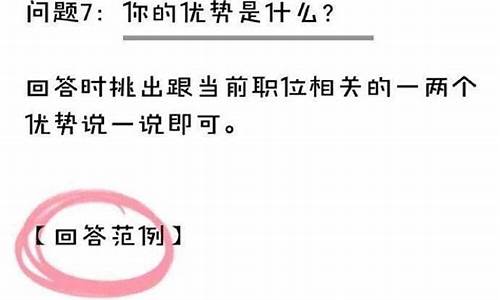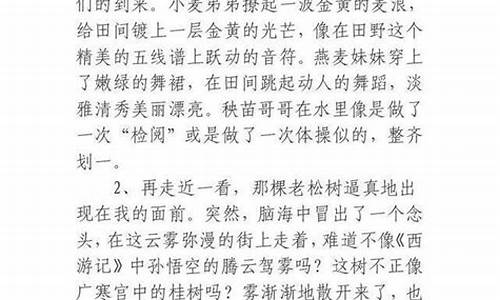英语面试常见问题及回答技巧
在接下来的时间里,我将为大家提供一些关于英语面试常见问题及回答技巧的信息,并尽力回答大家的问题。让我们开始探讨一下英语面试常见问题及回答技巧的话题吧。
1.外企英语面试都会说些什么
2.面试英语常问的一些问题以及回答
3.英语面试问题回答技巧::你对我们公司有什么了解?
4.英文电话面试常见问题回答技巧
5.英语口语面试常见十二大话题
6.英语面试常见的31个问题和答案

外企英语面试都会说些什么
在接到外企面试通知后,求职者就要马上让自己进入到面试的状态中,当然这个面试过程的交流一般而言都是用英语进行的,外企面试英语都会说些啥?如何你的英语不是足够的流畅,能够对答入流,你最好能够在面试前,了解一些常见的外企面试英语题目,以保障在英语面试中出色表现。
常见的外企面试英语题目与对答技巧:
q: can you sell yourself in two minutes? go for it.
(你能在两分钟内自我推荐吗?大胆试试吧!)
a: with my qualifications and experience, i feel i am hardworking, responsible and diligent in any project i undertake. your organization could benefit from my analytical and interpersonal skills.
(依我的资格和经验,我觉得我对所从事的每一个项目都很努力、负责、勤勉。我的分析能力和与人相处的技巧,对贵单位必有价值。)
q:why did you leave your last job?
(你为什么离职呢?)
a: well, i am hoping to get an offer of a better position. if opportunity knocks, i will take it.
我希望能获得一份更好的工作,如果机会来临,我会抓住。
a:i feel i have reached the "glass ceiling" in my current job. / i feel there is no opportunity for advancement.
我觉得目前的工作,已经达到顶峰,即没有升迁机会。
q:how do you handle your failure?
(你怎样对待自己的失败?)
a: none of us was born "perfect". i am sure i will be given a second chance to correct my mistake.
我们大家生来都不是十全十美的,我相信我有第二个机会改正我的错误。
q: what contribution did you make to your current (previous) organization?
(你对目前/从前的工作单位有何贡献?)
a: i have finished three new projects, and i am sure i can apply my experience to this position.
我已经完成三个新项目,我相信我能将我的经验用在这份工作上。
q:do you work well under stress or pressure?
(你能承受工作上的压力吗?)
a:the trait is needed in my current(or previous) position and i know i can handle it well.
这种特点就是我目前(先前)工作所需要的,我知道我能应付自如。
外企面试英语都会说些啥?除了以上基本的常见外企面试英语对答题,求职者在面试前,最好能多了解一些你面试的那个组织的背景,文化,活动等等,有利于在面试回答问题时尽量往那个方向靠拢,我想这绝对是有益无害的,不过也没必要去背什么的,心中有个概念就好。
面试英语常问的一些问题以及回答
外航英语面试问题面试是通过书面或面谈的形式来考察一个人的工作能力与否,物以类聚,通过面试可以初步判断应聘者是否可以融入自己的团队。是一种经过组织者精心策划的招聘活动。本文是我精心编辑的外航英语面试问题,希望能帮助到你!
外航英语面试问题篇一
Please tell me something unreflected at yourC.V./about yourself/your experience/your activities.谈谈你简历中没有提及的一些事情/谈谈你自己/你的经历/你参与的活动。
An example of team work.举出一个你参与团体合作的例子。
Why do you choose this position?你为什么选择这个职位。
Why should we hire you?为什么我们应该雇用你? 开放式讨论如In formationTechnology(信息技术)或者the role of university in society(大学的社会角色)等,主要考查求职者的思维方式。
自由提问。求职者可以事先准备一些问题去询问面试官。
听不清时怎么办
如果有话语没有听清楚,求职者不必紧张,可以镇定地请求再说一遍。可以用到的句子: 字串8 pardon?请再说一遍 Would you please simplify the question?您能把这个问题说得简单些吗?
Would you please say iti nother words?您能用别的话来表达您的意思吗?
Would you please speak a little bit louder?I can not hear you clearly.您说话声音能大一点好吗?我听不清楚。
如何应对突袭电话面试 当你正在球场或者公交车上突然接到了面试电话,此时没有任何准备,建议你首先试探看看是否可以给你个准备时间稍后再进行电话面试。可以用到的句子:
May I call you back half an hour l ater?May I have your phone number and recall you? 如果可以赢得时间,你应该马上赶回去,摊开资料写出一个提纲,从容应答。如果对方不同意推迟时间,你应该马上找个安静的地方坐下来开始回答。
下面是一些典型的面试题目:
1.what are your plan in 5 to 10 years?
2.what is your toefl score?
3.do you apply any other school?
4.is your research project very difficult?
5.if you are given an offer, can you come here this july?
6.what‘s you graduate research work?
7.why pursue ph。d。?
8.please introduce yourself。
9.where are you from?
10.what‘s your major?
11.please tell me your working experience。
12.what will you plan to do in the future?
13.what‘s your hobby? what do you do in your spare time?
14.if we give you this offer, will you accept it?
15.why are you interested in university?
16.why are you going to usa not staying your homeland to study?
17.say something about your work, etc。
18.who is the great person in the world in your eyes?
19.do you have some question on me or on my institute?
20.do you have any special or excellent idea during your research experience?
21.did you use any english textbook in classes?
22.will you like to study in a small but with high quality university or a big university like harvard or princeton?
23.do you apply for other university or contact with other faculties in the university?
24.how about your ability to be a teaching assistant?
如果你提前知道了电话面试的时间,则可以在面试时把简历、cover letter放在你旁边的桌子上,直接运用里面的句子回答问题。一些基本的问题,你可以事先准备好答案。通常,在电话英语面试的时候会提道:
·Please tell me something unreflected at your C.V./about yourself/your experience/your activities.谈谈你简历中没有提及的一些事情/谈谈你自己/你的经历/你参与的活动。
·An example of team work.举出一个你参与团体合作的例子。
·Why do you choose this position?你为什么选择这个职位。
·Why should we hire you?为什么我们应该雇用你?
·开放式讨论如Information Technology(信息技术)或者the role of university in society(大学的社会角色)等,主要考查求职者的思维方式。
·自由提问。求职者可以事先准备一些问题去询问面试官。
听不清时怎么办
如果有话语没有听清楚,求职者不必紧张,可以镇定地请求再说一遍。可以用到的句子:
·pardon?请再说一遍
·Would you please simplify the question?您能把这个问题说得简单些吗?
·Would you please say it in another words?您能用别的话来表达您的意思吗?
·Would you please speak a little/bit louder?I can not hear you clearly.您说话声音能大一点好吗?我听不清楚。
如何应对突袭电话面试
当你正在球场或者公交车上突然接到了面试电话,此时没有任何准备,建议你首先试探看看是否可以给你个准备时间稍后再进行电话面试。可以用到的句子:
·May I call you back half an hour later?May I have your phone number and recall you?
如果可以赢得时间,你应该马上赶回去,摊开资料写出一个提纲,从容应答。如果对方不同意推迟时间,你应该马上找个安静的地方坐下来开始回答。(
如果你曾经花时间去寻找一份工作,你可能有过一到两次的电话面试的经历。如果你没有,那么你很有可能会尝试到这种更加有效率的方式,因为越来越多的公司开始通过电话筛选的方式来遴选候选人。
虽然面试对那些经理人来说是一件很琐碎的事情,不过知道怎么去应对一次电话面试是至关重要的,因为这可能是寻找工作过程中的决定因素。当你希望你的经验与技术能够为你带来一次面对面的面试机会时,有必要确信你在电话中的无礼或者准备不充分不会阻碍你面试机会的出现。
电话面试的技巧
虽然下面这些电话面试的技巧看上去很简单,但是这有助于使你头脑清醒并提醒你在电话面试中什么是该做的什么是不该做的,以便你不会因为忘记了其中一个要点而丧失了一个很棒的机会。
技巧 1 : 环境
确保你的面试是环境安静的,这样你就不会被弄得心绪不宁或被打断,而且还要保证电话是通的。
很明显,你不应该打算在工作的时候接受一次电话面试。如果面试必须在中午进行,那么你应该让自己尽量少的离开办公室。如果在家里闲着,要确定你的家人是理解你的,让你占用电话并且在你面试的时候不会被打搅。把宠物都放到门外面去,并且关上你办公室的门。如果你能避免别人在电话呼叫中的等待,最好就这么做。
还有记住不要关掉你的移动电话。
技巧 2 : 工具
在手边放一支钢笔和一张纸。你可能回在面试的时候记上一点东西。而且钢笔要能够写,更好一点的是在很容易拿到的地方放上一两支备用的。
把你的履历表是放在你的正前方,同时准备一份你要问面试者的问题的清单。你还需要整理出一份你所掌握的技术的列表,连同它们相应的时间和地点,这就让你实力一目了然。
在你的桌子附近放一面镜子来提醒你保持微笑也是一个好主意。如果在整个电话中你的面部表情一直是微笑,那么你将给人更多积极的乐观的印象。不管怎样,不要闹出笑话。因为没有了肢体语言的优势,你的幽默很容易被误解。
技巧 3 : 声音
说话要清楚,不要说的太急。感到紧张是很自然的,但是要试着让自己慢慢放松。如果你说的太急,面试者将会很难听懂你的意思。一旦你感觉到很紧张,而且在说某些话时无法继续下去,最好停下来,深深的吸一口气,然后说:"对不起,请让我再来一次。"没有人会因为这些细微的紧张就给你下定论。不过你千万不要让紧张的情绪控制住了自己。
技巧 4 : 答案
认真的听你被问到的问题。注意面试者的用词,他(她)所说的大部分都是专业术语吗?要让你的答案显示你对那些专业术语是如此的熟悉--但同时也要让他(她)知道你可以跟普通人交流。不要让你的回答局限于行话之中--要让面试者可以评价你和普通人交流专业知识的能力。不必担心在回答一个问题之前你需要花一点时间去思考。不过不管怎样,因为面试者不能够看见你,所以你需要给他(她)一些口头的`暗示,比如:"我希望能够给你一个完整的答案,请给我一点时间来整理一下我所想到的。"
技巧 5 :感谢
千万不能忘记,在面试的结束的时候要记得感谢面试者占用了他(她)的时间,而且你还要保证面试者有你正确的电话号码,以便在接下来的几个星期里他(她)能找到你(如果你已经打算去旅游或者要出远门,把日期延迟是相当重要的)。
面试结束后
立即挂上电话,写一份关于面试的简短的感谢信,如果你发电子邮件的话必须在一个小时内发出,如果是发普通信件的话在这一天之内就可以了。
在你的感谢信里面,重申你对占用了面试者的时间的感激以及给一些其它的问题的答复是很重要的。如果你发现在面试的时候你有一个很重要的经历没有被提到,那么这封感谢信将是补充这些附加信息的最好的地方。
一旦邮件发出了,你就把大致可以得到反馈信息的时间在电子邮件日历或者桌子的日历上做一个记号。留意一下,如果在这之后的一个星期内还没有得到任何答复,也不要以为事情已经到了最糟糕的地步。你要知道这可能是因为你的时间表订的太紧了;也有可能是你的面试者现在正忙得不可开交。去打个电话但是不要说太多的话。如果仍然没有音讯的话,下一个电话就需要询问关于进行面对面面试的人选是否已经决定或者你什么时候可以得到答复。如果你能够得到一个预约见面的日期,这证明你就是最好的。
电话面试在找工作时可能是一种威胁--特别是对于那些没有经历过电话面试的管理者或者第一次找工作的人。但是如果你的准备足够充分,你将会坚信自己的能力并且能够通过电话线让别人看到你的才干。
外航英语面试问题篇二Following are some typical questions that an interviewer may ask during a job interview, and some typical responses:
下面是会见者在工作面试中可能会问到的一些典型问题和一些典型的回答:
Can you tell me a little more about the Canto project that you did at ABC Incorporated?
你能更具体地告诉我一些你为ABC公司做的Canto计划的一些情况吗?
Oh, that was a very exciting project. We had to increase sales by 40% during the 2nd quarter, and our results exceeded expectations, even though we were under a lot of pressure.
那是个非常激动人心的工程。我们必须在第二季度使销售额增长40%,虽然我们承受着很大的压力,但结果比我们的预期计划要好。
Why should I hire you?
我为什么要雇用你呢?
I feel that my qualifications match your job description. I have a proven track record in resolving problems, multitasking, and dealing with customers, as you can see from my resume.
我觉得我的条件正适合你们的工作类型。从我的简历中你可以看到我有一份证实我在解决问题,进行多重任务工作,和处理顾客问题方面能力的证明资料。
What can you offer this company?
你能为公司做出什么贡献呢?
In addition to the skills and experience we discussed, I'm an extremely hard worker, I'm very thorough and methodical, I get along great with people, and I'm a quick learner.
除了我们刚才讨论过的技能和经历之外,我是一个工作非常努力的人,我工作很认真,而且很有办法,我能与大家相处得非常好,并且我学得很快。
Can you tell me some of your strengths and weaknesses?
你能告诉我你的强项和弱项吗?
I'm loyal, honest, I manage my time effectively, I always follow through on my work, and I have great computer skills. Umm, I can't really say I have any major weakness that affects my performance at work. I believe in continual learning and on-the-job training so that I can perform even better. Sometimes, I think I'm too hard-working, but I really love my work.
我忠诚,诚实,能有效地利用我的时间,我工作有头有尾,并且我有很强的计算机运用能力。事实上我没有什么会影响到我的工作表现的重大弱点,我坚信通过不断地学习和在职培训我会表现得更好。有时我工作太疯狂了,但我实在太热爱我的工作了。
Great! So when can you start?
好极啦。你什么时候可以上班呢?
I have to give two weeks’ notice, which is just enough time to complete my current project. I can start any time after that.
我必须提前两周提交辞职报告,在这两周内,我要继续工作并完成目前的任务。两周后,我可以随时上班。
;英语面试问题回答技巧::你对我们公司有什么了解?
1:Q: Can you sell yourself in two minutes? Go for it. (你能在两分钟内自我推荐吗?大胆试试吧!)
A: With my qualifications and experience, I feel I am hardworking,
responsible and diligent in any project I undertake. Your organization could
benefit from my analytical and interpersonal skills.
2:Q:How do you rate yourself as a professional?(你如何评估自己是位专业人员呢?
A: With my strong academic background, I am capable and competent.
3:Q:What do you think you are worth to us?(你怎么认为你对我们有价值呢?)
A:I feel I can make some positive contributions to your company in the
future. (我觉得我对贵公司能做些积极性的贡献。)
4:Q:What make you think you would be a success in this position? (你如何知道你能胜任这份工作?)
A:My graduate school training combined with my internship should qualify me for this particular job. I am sure I will be successful. (我在研究所的训练,加上实习工作,使我适合这份工作。我相信我能成功。)
5:Q:What is your strongest trait(s)?(你个性上最大的特点是什么?)
A:Helpfulness and caring.(乐于助人和关心他人。)
6:Q: How would your friends or colleagues describe you?(你的朋友或同事怎样形容你?)
A: (pause a few seconds) (稍等几秒钟再答,表示慎重考虑。)
They say Mr. Chen is an honest, hardworking and responsible man who deeply
cares for his family and friends. (他们说陈先生是位诚实、工作努力,负责任的人,他对家庭和朋友都很关心。)
7:Q:How do you normally handle criticism?(你通常如何处理别人的批评?)
A:Silence is golden. Just don't say anything; otherwise the situation could
become worse. I do, however, accept constructive criticism. (沈默是金。不必说什么,否则情况更糟,不过我会接受建设性的批评。)
8:Q:How do you handle your conflict with your colleagues in your work? (你如何处理与同事在工作中的意见不和?)
A:I will try to present my ideas in a more clear and civilized manner in
order to get my points across. (我要以更清楚文明的方式,提出我的看法,使对方了解我的观点。)
9:Q:How do you handle your failure?(你怎样对待自己的失败?)
A: None of us was born "perfect". I am sure I will be given a second chance
to correct my mistake. (我们大家生来都不是十全十美的,我相信我有第二个机会改正我的错误。)
10:Q: How long would you like to stay with this company?(你会在本公司服务多久呢?)
A: I will stay as long as I can continue to learn and to grow in my field.
(只要我能在我的行业力继续学习和长进,我就会留在这里。)
英文电话面试常见问题回答技巧
英语面试问题回答技巧::你对我们公司有什么了解?当面试的时候被问你对我们公司有什么了解?应该怎么回答,下面是整理的关于这个问题的回答技巧,欢迎阅读!
What do you know about our organization?
问:?你对我们公司有哪些了解?
1.Answer structure回答结构
? Give 2 ? 3 pieces of information youknow about the company, which are appeal to customers and candidates.
?说出2到3条你对这个公司的了解。内容要是客户及公司求职者感兴趣的。
? Give out your skills, abilities,experiences and knowledge which can be suitable and developed.
?说出自己适应公司需要或者潜在的技能,能力,经验和知识。
? Ask questions about the company, such asadvantages compared to the opponentfirms; career development opportunity,company?s ability to expand etc.
?对应聘公司提出问题。例如与对手公司相比,该公司有哪些优势;在公司的职业发展机会;以及公司自身的发展能力,等等。
2. Answer tips回答小贴士
Some contents you can mention include:products and services, sales compared in the industry, brand, management,history and culture of the company.
你可以提到以下内容:公司的产品和服务,与同行业相比销售情况,企业品牌、管理、历史和文化。
Show your knowledge but do not prove thatyou know everything. Give the information to show your recent learning efforts.
展示自己的知识,但不要让别人觉得自己全部了解。展示自己最新学习能力。
Do not give personal comments such as: Ithink the CEO is well-known for dressing fashionably; or the boss of thecompany is a powerful person?.
不要做过多个人主观性评论,例如,我认为执行总裁的穿着很时尚,或公司的老板是个很强势的人,等。
Include active information about yourresearch; Don?t be passive, for example: The receptionist said that the companyis well-known for?
谈话内容要积极展示自己的研究。不可以消极,例如,接待员说本公司以某某方面而著名,等等。
3. Answer samples回答示范
I think your company is the best in IT industry.It provides a perfect working environment for employees, thanks to which, itmay maintain a very good service in IT industry.
我认为贵公司是IT产业中的佼佼者。为员工提供了良好的工作环境,基于此,贵公司将持续为IT业提供良好的服务。
延伸阅读:
our Questions 你的问题
Towards the end of an interview, the interviewer will usually ask ?Do you have any questions for us? 在面试即将结束时,面试官通常会问?你有什么问题要问我们吗?
Be sure to research information about the company through their website, pamphlets, etc. beforehand. This will help you formulate appropriate questions when they ask you if you have questions. 一定要在事先浏览公司的网站、宣传册等来研究相关信息。这对你是十分有帮助的,面试中当被问到你是否有疑问时就能迅速想出合适的`问题。
For example, while you are researching the company on the web, you may stumble upon information regarding an annual exhibition where a couple of employees must give presentations and represent the company at a booth. With this information, you could ask: 例如,当你在网上研究该公司网站时,可能会偶然发现一些信息,比如在公司年度展会上,一些员工需要发言或者代表公司在展位上站台。了解了这些信息,你就可以问:?Who is chosen to represent the company each year? Can I work my way up to becoming a representative? Which topics do these individuals lecture on? 每一年哪些人会被选中来代表公司?我能争取做这个代表吗?他们的个人演讲主题都是什么?
Doing your research shows you are ambitious and knowledgeable about the company. It really pays off! 你自己做功课了解公司让人觉得你对公司是有野心的、有见地的。这是非常值得的!
My students on italki often want to ask this question: ?What will my salary be? AVOID THIS QUESTION. 我在italki上的学生常常希望问这个问题: 我的薪酬将有多少?请避免这一类的问题。
It makes it look like you only care about the money and not the position. Every employer knows the candidate is eager to know this information. 这种问题会让人看起来像你只关心钱而不是职位。事实上每一个雇主都知道他们的应试者急切地想知道这方面的信息。
The interviewer should also provide you with a time frame in which you can expect to hear from them about a second interview or if you have received the position. 面试官也应该为你提供一个时间窗口,在哪个阶段你能收到通知去参加第二轮面试或者你能够得到这个职位。
;英语口语面试常见十二大话题
1、刚接电话的时候,千万别发傻。他说may i speak to ?的时候,你可以回答,year, it?s me. you must be prof 。然后一定要问他how are you? 这样会给对方一个比较的第一印象。2、最后的时候,一定要thanks for calling。而且打完电话之后,还要跟上一封email。
3、一般会了解一下你的专业知识。尽你所能,如实地回答。
4、有时会问你,毕业之后要干嘛。不是说你要回来还是要留下,而是要问你想教书还是想到业界工作?
5、准备一两个小问题问他,觉得你挺了解而且挺重视他们学校的。
一定要注意礼貌,如果有问题回答不出来的,你可以跟他说,i have no idea of it now. can i reply you later by email?
如何回答四类刁钻面试问题
面试问题1:你愿意接受薪水低于你预期的工作吗?
这个问题的真正意思是?你以这份工作的热情度有多高?工作对你有吸引力吗?因此,薪水高低不是关键问题,就算你今天中了大奖,仍会在这家公司工作才是回答的重点,所以回答的方式很简单,只要表现出你对这份工作、对服务于这家公司的最大热情即可,同时强调你对这份工作兴趣极大。
面试问题2:你最大的缺点是什么?
这个问题非常刁钻,一个人不可能没有缺点,但如果你真的很老实地说出你的缺点,就等于自暴其短,断了自己的生路;如果回答说没有缺点,岂不是更假了?所以,回答时要着重在过去经验上,强调自己学到哪些东西,有哪些进步。例如,你在担任小组负责人时,学到了如何倾听别人的建议。绝不要说你自己的缺点,也不能说超过一个以上的缺点。
面试问题3:你计划在公司工作多久?
当你不想回答?我愿意做一辈子?或?也许几年?这类回答时,你该怎么说?你需要重新组织一下回答的内容,先说你想在这家公司工作的原因,将话题转到对这份工作能否激起励你的哪些潜能、对你有多少吸引力等。例如:在你评估这份工作确实有机会让你一展所长时,你可以回答:?只要机会一直存在,我就会一直待下去。?
面试问题4:你小孩今年几岁?
这是已婚求职者经常会碰到的问题,大多数人通常会脱口而出孩子的年龄。
其实,主管关心的并不是你孩子到底多大,此问题的背后陷阱是:如果我们雇佣你,家中的小孩会不会是你工作的绊脚石,让你分心工作?这真是个烫手问题,多数主管常对已婚有孩子的员工有负面印象,认为他们的?私人?问题比较多,反而偏爱雇佣单身员工。这时,你可以回答说:?老板,我了解你的感受。不过,请你放心,我有一套照顾小孩的安排计划,我保证每天能专心工作,不受那些小麻烦的影响。?
英语面试常见的31个问题和答案
英语口语面试常见十二大话题考试就要开始了,对还有什么不了解的呢?为考生们提供各种面试、学习、择校等技巧及经验,希望可以帮助大家考得好成绩。在这里预祝大家考出理想成绩。
话题一:个人情况(Personal information)
能够向他人介绍个人的基本情况(姓名、年龄、出生日期、家庭成员、电话号码、爱好、邮箱地址、外貌、特征和自己的生活情况等),并能够写出自己简单的基本情况。
能够听懂他人的有关个人信息,并且记录简单信息。
话题二:家庭(Family and home)
能够介绍家庭成员(姓名、年龄、职业、外貌特征、爱好等)的基本信息。
能够利用所学的语言,互相询问有关对方家庭的基本情况。
能够简单地写出家庭成员的基本信息。
能够介绍家庭住房的各种房间的名称,并能简单描述部分室内的物品。
能够简单介绍家庭成员平时经常在这些房间做的事情。
尝试着设计自己梦想中的卧室,调查同学家里房间的拥有情况。
话题三:学校(Schoollife)
能够介绍自己的学校生活(学校名称、任课教师、专业教室的名称等)。
能够介绍自己的学习科目,喜欢和不喜欢的科目,并能简单单说明理由。
能够向他人介绍自己的课程表,并设计自己喜欢的课程表。
话题四:朋友(Friends)
能够简单介绍自己的朋友(姓名、年龄、外貌特征、爱好等)。
能够简单地写出朋友的主要信息。
话题五:天气(Weather)
能够谈论有关天气情况。
能够听懂简单的天气预报,并记录相关的'信息。
能够根据天气情况,设计自己的活动计划(合适的着装、活动去向、活动目的等)。
话题六:饮食(Food and drink)
能够表达自己喜欢和不喜欢的食物,并简单说明理由。
能够简单介绍自己一日三餐的饮食。
能够根据自己的喜好,为自己或他人点餐。
知道什么是良好的饮食习惯。
初步了解中西方关于饮食文化的差异。
话题七:动物(Animals)
能够表达自己喜欢和不喜欢的动物,并说出为什么。
能够描述动物的外貌特征以及它们的习性。
话题八:购物(Shopping)
能够询问物品的价格。
能够描述自己对所需物品的看法(如颜色、尺寸、大小等)。
能够帮助顾客选择喜欢的商品,提出自己的建议。
能够设计购物清单,进行合理的购物。
话题九:节假日(Holidays and Festivals)
能够介绍自己节假日的安排、打算,并询问他人的相关计划。
能够简单描述自己渡过的一个节假日的活动,如生日晚会等。
能够初步了解中西方不同的节日,并知道如何相互表示祝贺。
能够表达自己喜欢的节日,并简单地说明理由。
话题十:日常生活(Dailylife)
能够介绍自己一天的生活起居。
能够说出一天当中在什么时间通常应该做的事情。
能够说出自己的计划、打算以及准备进行的课外活动。
话题十一:文体活动(Activities)
能够介绍自己的业余活动和业余爱好。
能够介绍自己喜欢和不喜欢的运动,并说明理由。
能够简单描述自己最近参加的一次最有意义的活动。
话题十二:健康和习惯(Health and Habits)
能够介绍自己的生活习惯。
能够说明自己的身体哪里不适。
能够询问他人的身体健康状况。
能够给他人提出合理的健康建议。
以上是英语口语面试十二大话题,读后您收获多少呢?
;英语面试常见提问问题
英语面试常见的31个问题和答案中外HR们手中的`问题其实是差不多的,思维模式大同小异。这31个问题,也经常出现在中国HR的问题单里,或许他们最先的起源就是微软、GOOGLE等公司的HR们。有人说:?全球化实际上就是美国化?,这下你明白了吧?读者们可以收藏了,熟读这些题目,去什么外企面试都不怕了。
Wouldn't it be great if you knew exactly what a hiring manager would be asking you in your next interview?
While we unfortunately can't read minds, we'll give you the next best thing: a list of the 31 most commonly asked interview questions and answers.
While we don't recommend having a canned response for every interview question (in fact, please don't), we do recommend spending some time getting comfortable with what you might be asked, what hiring managers are really looking for in your responses, and what it takes to show that you're the right man or woman for the job.
Consider this your interview study guide.
1. Can you tell me a little about yourself?
This question seems simple, so many people fail to prepare for it, but it's crucial. Here's the deal: Don't give your complete employment (or personal) history. Instead give a pitch?one that?s concise and compelling and that shows exactly why you?re the right fit for the job. Start off with the 2-3 specific accomplishments or experiences that you most want the interviewer to know about, then wrap up talking about how that prior experience has positioned you for this specific role.
2. How did you hear about the position?
Another seemingly innocuous interview question, this is actually a perfect opportunity to stand out and show your passion for and connection to the company. For example, if you found out about the gig through a friend or professional contact, name drop that person, then share why you were so excited about it. If you discovered the company through an event or article, share that. Even if you found the listing through a random job board, share what, specifically, caught your eye about the role.
3. What do you know about the company?
Any candidate can read and regurgitate the company?s ?About? page. So, when interviewers ask this, they aren't necessarily trying to gauge whether you understand the mission?they want to know whether you care about it. Start with one line that shows you understand the company's goals, using a couple key words and phrases from the website, but then go on to make it personal. Say, ?I?m personally drawn to this mission because? or ?I really believe in this approach because? and share a personal example or two.
4. Why do you want this job?
Again, companies want to hire people who are passionate about the job, so you should have a great answer about why you want the position. (And if you don't? You probably should apply elsewhere.) First, identify a couple of key factors that make the role a great fit for you (e.g., ?I love customer support because I love the constant human interaction and the satisfaction that comes from helping someone solve a problem"), then share why you love the company (e.g., ?I?ve always been passionate about education, and I think you guys are doing great things, so I want to be a part of it?).
5. Why should we hire you?
This interview question seems forward (not to mention intimidating!), but if you're asked it, you're in luck: There's no better setup for you to sell yourself and your skills to the hiring manager. Your job here is to craft an answer that covers three things: that you can not only do the work, you can deliver great results; that you'll really fit in with the team and culture; and that you'd be a better hire than any of the other candidates.
6. What are your greatest professional strengths?
When answering this question, interview coach Pamela Skillings recommends being accurate (share your true strengths, not those you think the interviewer wants to hear); relevant (choose your strengths that are most targeted to this particular position); and specific (for example, instead of ?people skills,? choose ?persuasive communication? or ?relationship building?). Then, follow up with an example of how you've demonstrated these traits in a professional setting.
7. What do you consider to be your weaknesses?
What your interviewer is really trying to do with this question?beyond identifying any major red flags?is to gauge your self-awareness and honesty. So, ?I can't meet a deadline to save my life? is not an option?but neither is ?Nothing! I'm perfect!? Strike a balance by thinking of something that you struggle with but that you?re working to improve. For example, maybe you?ve never been strong at public speaking, but you've recently volunteered to run meetings to help you be more comfortable when addressing a crowd.
8. What is your greatest professional achievement?
Nothing says ?hire me? better than a track record of achieving amazing results in past jobs, so don't be shy when answering this interview question! A great way to do so is by using the S-T-A-R method: Set up the situation and the task that you were required to complete to provide the interviewer with background context (e.g., ?In my last job as a junior analyst, it was my role to manage the invoicing process?), but spend the bulk of your time describing what you actually did (the action) and what you achieved (the result). For example, ?In one month, I streamlined the process, which saved my group 10 man-hours each month and reduced errors on invoices by 25%.?
9. Tell me about a challenge or conflict you've faced at work, and how you dealt with it.
In asking this interview question, ?your interviewer wants to get a sense of how you will respond to conflict. Anyone can seem nice and pleasant in a job interview, but what will happen if you?re hired and Gladys in Compliance starts getting in your face? says Skillings. Again, you'll want to use the S-T-A-R method, being sure to focus on how you handled the situation professionally and productively, and ideally closing with a happy ending, like how you came to a resolution or compromise.
10. Where do you see yourself in five years?
If asked this question, be honest and specific about your future goals, but consider this: A hiring manager wants to know a) if you've set realistic expectations for your career, b) if you have ambition (a.k.a., this interview isn't the first time you're considering the question), and c) if the position aligns with your goals and growth. Your best bet is to think realistically about where this position could take you and answer along those lines. And if the position isn?t necessarily a one-way ticket to your aspirations? It?s OK to say that you?re not quite sure what the future holds, but that you see this experience playing an important role in helping you make that decision.
11. What's your dream job?
Along similar lines, the interviewer wants to uncover whether this position is really in line with your ultimate career goals. While ?an NBA star? might get you a few laughs, a better bet is to talk about your goals and ambitions?and why this job will get you closer to them.
12. What other companies are you interviewing with?
Companies ask this for a number of reasons, from wanting to see what the competition is for you to sniffing out whether you're serious about the industry. ?Often the best approach is to mention that you are exploring a number of other similar options in the company's industry,? says job search expert Alison Doyle. ?It can be helpful to mention that a common characteristic of all the jobs you are applying to is the opportunity to apply some critical abilities and skills that you possess. For example, you might say 'I am applying for several positions with IT consulting firms where I can analyze client needs and translate them to development teams in order to find solutions to technology problems.'?
13. Why are you leaving your current job?
This is a toughie, but one you can be sure you'll be asked. Definitely keep things positive?you have nothing to gain by being negative about your past employers. Instead, frame things in a way that shows that you're eager to take on new opportunities and that the role you?re interviewing for is a better fit for you than your current or last position. For example, ?I?d really love to be part of product development from beginning to end, and I know I?d have that opportunity here.? And if you were let go? Keep it simple: ?Unfortunately, I was let go,? is a totally OK answer.
14. Why were you fired?
OK, if you get the admittedly much tougher follow-up question as to why you were let go (and the truth isn't exactly pretty), your best bet is to be honest (the job-seeking world is small, after all). But it doesn't have to be a deal-breaker. Share how you?ve grown and how you approach your job and life now as a result. If you can position the learning experience as an advantage for this next job, even better.
15. What are you looking for in a new position?
Hint: Ideally the same things that this position has to offer. Be specific.
16. What type of work environment do you prefer?
Hint: Ideally one that's similar to the environment of the company you're applying to. Be specific.
17. What's your management style?
The best managers are strong but flexible, and that's exactly what you want to show off in your answer. (Think something like, ?While every situation and every team member requires a bit of a different strategy, I tend to approach my employee relationships as a coach...?) Then, share a couple of your best managerial moments, like when you grew your team from five to 15 or coached an underperforming employee to become the company's top salesperson.
18. What's a time you exercised leadership?
Depending on what's more important for the the role, you'll want to choose an example that showcases your project management skills (spearheading a project from end to end, juggling multiple moving parts) or one that shows your ability to confidently and effectively rally a team. And remember: ?The best stories include enough detail to be believable and memorable,? says Skillings. ?Show how you were a leader in this situation and how it represents your overall leadership experience and potential.?
19. What's a time you disagreed with a decision that was made at work?
Everyone disagrees with the boss from time to time, but in asking this interview question, hiring managers want to know that you can do so in a productive, professional way. ?You don?t want to tell the story about the time when you disagreed but your boss was being a jerk and you just gave in to keep the peace. And you don?t want to tell the one where you realized you were wrong,? says Peggy McKee of Career Confidential. ?Tell the one where your actions made a positive difference on the outcome of the situation, whether it was a work-related outcome or a more effective and productive working relationship.?
20. How would your boss and co-workers describe you?
First of all, be honest (remember, if you get this job, the hiring manager will be calling your former bosses and co-workers!). Then, try to pull out strengths and traits you haven't discussed in other aspects of the interview, such as your strong work ethic or your willingness to pitch in on other projects when needed.
21. Why was there a gap in your employment?
If you were unemployed for a period of time, be direct and to the point about what you?ve been up to (and hopefully, that?s a litany of impressive volunteer and other mind-enriching activities, like blogging or taking classes). Then, steer the conversation toward how you will do the job and contribute to the organization: ?I decided to take a break at the time, but today I?m ready to contribute to this organization in the following ways.?
22. Can you explain why you changed career paths?
Don't be thrown off by this question?just take a deep breath and explain to the hiring manager why you've made the career decisions you have. More importantly, give a few examples of how your past experience is transferrable to the new role. This doesn't have to be a direct connection; in fact, it's often more impressive when a candidate can make seemingly irrelevant experience seem very relevant to the role.
23. How do you deal with pressure or stressful situations?
"Choose an answer that shows that you can meet a stressful situation head-on in a productive, positive manner and let nothing stop you from accomplishing your goals," says McKee. A great approach is to talk through your go-to stress-reduction tactics (making the world's greatest to-do list, stopping to take 10 deep breaths), and then share an example of a stressful situation you navigated with ease.
24. What would your first 30, 60, or 90 days look like in this role?
Start by explaining what you'd need to do to get ramped up. What information would you need? What parts of the company would you need to familiarize yourself with? What other employees would you want to sit down with? Next, choose a couple of areas where you think you can make meaningful contributions right away. (e.g., ?I think a great starter project would be diving into your email marketing campaigns and setting up a tracking system for them.?) Sure, if you get the job, you (or your new employer) might decide there?s a better starting place, but having an answer prepared will show the interviewer where you can add immediate impact?and that you?re excited to get started.
25. What are your salary requirements?
The #1 rule of answering this question is doing your research on what you should be paid by using sites like Payscale and Glassdoor. You?ll likely come up with a range, and we recommend stating the highest number in that range that applies, based on your experience, education, and skills. Then, make sure the hiring manager knows that you're flexible. You're communicating that you know your skills are valuable, but that you want the job and are willing to negotiate.
26. What do you like to do outside of work?
Interviewers ask personal questions in an interview to ?see if candidates will fit in with the culture [and] give them the opportunity to open up and display their personality, too,? says longtime hiring manager Mitch Fortner. ?In other words, if someone asks about your hobbies outside of work, it?s totally OK to open up and share what really makes you tick. (Do keep it semi-professional, though: Saying you like to have a few beers at the local hot spot on Saturday night is fine. Telling them that Monday is usually a rough day for you because you?re always hungover is not.)?
27. If you were an animal, which one would you want to be?
Seemingly random personality-test type questions like these come up in interviews generally because hiring managers want to see how you can think on your feet. There's no wrong answer here, but you'll immediately gain bonus points if your answer helps you share your strengths or personality or connect with the hiring manager. Pro tip: Come up with a stalling tactic to buy yourself some thinking time, such as saying, ?Now, that is a great question. I think I would have to say
28. How many tennis balls can you fit into a limousine?
1,000? 10,000? 100,000? Seriously?
Well, seriously, you might get asked brainteaser questions like these, especially in quantitative jobs. But remember that the interviewer doesn?t necessarily want an exact number?he wants to make sure that you understand what?s being asked of you, and that you can set into motion a systematic and logical way to respond. So, just take a deep breath, and start thinking through the math. (Yes, it?s OK to ask for a pen and paper!)
29. Are you planning on having children?
Questions about your family status, gender (?How would you handle managing a team of all men?), nationality (?Where were you born?), religion, or age, are illegal?but they still get asked (and frequently). Of course, not always with ill intent?the interviewer might just be trying to make conversation?but you should definitely tie any questions about your personal life (or anything else you think might be inappropriate) back to the job at hand. For this question, think: ?You know, I?m not quite there yet. But I am very interested in the career paths at your company. Can you tell me more about that?
30. What do you think we could do better or differently?
This is a common one at startups (and one of our personal favorites here at The Muse). Hiring managers want to know that you not only have some background on the company, but that you're able to think critically about it and come to the table with new ideas. So, come with new ideas! What new features would you love to see? How could the company increase conversions? How could customer service be improved? You don?t need to have the company?s four-year strategy figured out, but do share your thoughts, and more importantly, show how your interests and expertise would lend themselves to the job.
31. Do you have any questions for us?
You probably already know that an interview isn't just a chance for a hiring manager to grill you?it's your opportunity to sniff out whether a job is the right fit for you. What do you want to know about the position? The company? The department? The team?
You'll cover a lot of this in the actual interview, so have a few less-common questions ready to go. We especially like questions targeted to the interviewer (?What's your favorite part about working here?") or the company's growth (?What can you tell me about your new products or plans for growth?")
; 掌握一门外语很重要,那英语面试时通常会遇到哪些问题呢?下面就由我为大家介绍一下英语面试常见提问问题的文章,欢迎阅读。英语面试常见提问问题篇1
1. What?s your name?
2. Does your name have any special meaning?
3. Where were you come from?
4. What kind of landscape surrounds your hometown?
5. What is the main crop in your hometown?
6. What is the difference between Beijing and your hometown?
7. What are the main places of interest in your hometown?
8. What is the climate like in your hometown?
9. What is the character of the people like in the region where you live?
10. What are the differences in accent between the people of your hometown and Beijing?
英语面试常见提问问题篇2
1. What is people?s favorite food in your region?
1. How do you make dumplings?
3. What do you do during the Spring Festival?
4. Why is the Spring Festival so important to Chinese people?
5. Can you describe one of the main festivals celebrated in your country?
6. Tell me something about the Lantern Festival.
7. Tell me something about the Qing Ming Festival.
8. Tell me something about the customs of your country.
9. How long have you lived in Beijing?
10. What is the weather like in Beijing?
11. How do you compare the climate in Beijing with that in your hometown?
英语面试常见提问问题篇3
1. What place in Beijing do you like best? Why ?
2. Which is the worst place you?ve been to China?
3. Which is the best place you?ve been to China?
4. What places in Beijing should a foreigner visit? Why?
5. What are the major social problems in Beijing? How can they be solved?
6. What is the biggest problem China faces?
7. What places in Beijing should a foreigner visit? Why?
8. Could you tell me something about your family?
9. Have you any children?
今天关于“英语面试常见问题及回答技巧”的探讨就到这里了。希望大家能够更深入地了解“英语面试常见问题及回答技巧”,并从我的答案中找到一些灵感。
声明:本站所有文章资源内容,如无特殊说明或标注,均为采集网络资源。如若本站内容侵犯了原著者的合法权益,可联系本站删除。












